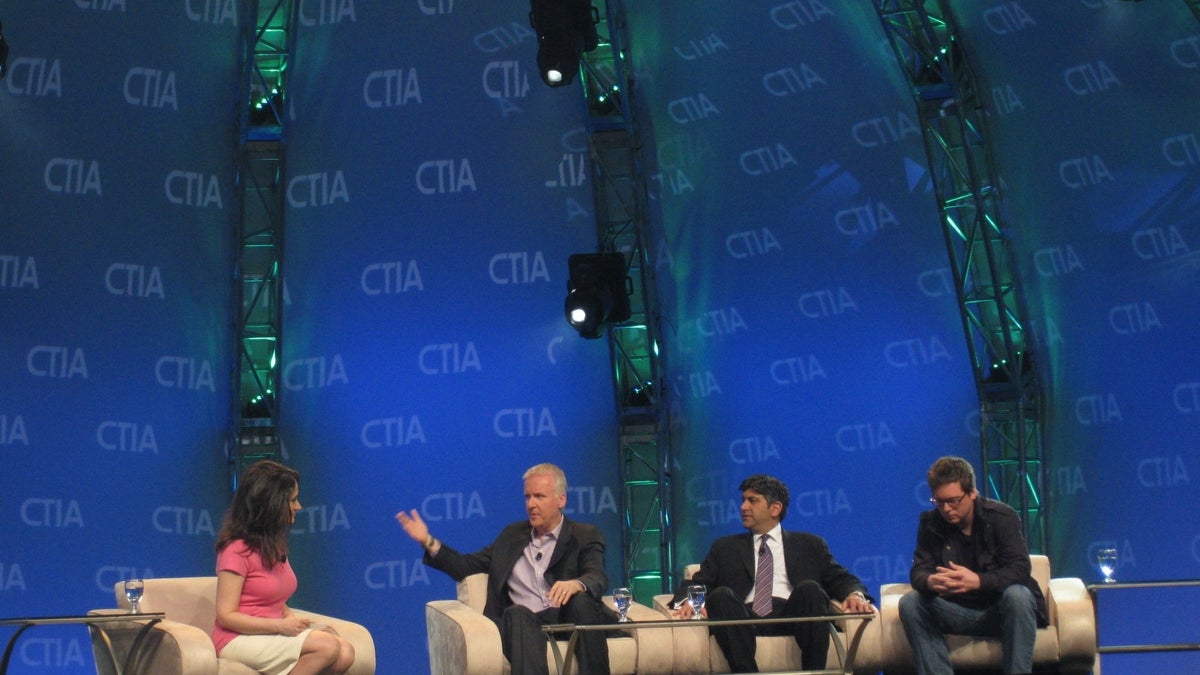James Cameron: Innovation trumps digital piracy
James Cameron, the award-winning director of "Avatar", believes creating innovative experiences for moviegoers is the best way for film-makers to continue making money.

LAS VEGAS- Oscar-winning director James Cameron says the key to combating digital piracy in the movie industry is to use technology to create an experience that is unmatched anywhere other than the theater.
While "Avatar," Cameron's blockbuster 3D-film, has made more money than any other movie in history topping $2.6 billion at the box office worldwide, it is also the most pirated movie. This is despite the fact that the movie was shot in bandwidth hungry high-definition 3D video and is more than three hours long, which should make it harder to distribute via the Net. Cameron joked his next movie would be five hours long.
"In film we have definitely felt threatened by piracy," he said. "We saw the music industry crash and burn in its efforts to stop it. But with G4 (I think he meant 4G wireless) and Moore's Law, you can't fight it."
Cameron joined Twitter co-founder Biz Stone, CNBC Anchor Michelle Caruso-Cabrera, and U.S. Chief Technology Officer Aneesh Chopra for a discussion at the CTIA 2010 tradeshow Thursday morning.The group, assembled at the wireless industry's largest gathering in the U.S., discussed a range of topics from Internet piracy to using Twitter to promote free speech to Net Neutrality to Google's exit from the Chinese market.
But the most interesting part of the discussion centered around Cameron's thoughts on digital piracy and how new technologies, such as high-definition 3D video, can create new experiences for viewers and drive demand.
He said the music industry made a critical mistake by trying to stop piracy instead of innovating to give consumers new experiences that the industry could use to generate more money.
"The music industry saw it coming, they tried to stop it, and they got rolled over," he said. "Then they started suing everybody. And now it is what it is."
Instead, Cameron said he has tried to innovate to give movie goers a reason to go to theater. And in creating a rich, "reinvigorated cinema experience," Cameron said he discovered that people are willing to pay money to experience the same content in different ways. Not only are they willing to pay $10 or more to see Avatar on the big screen in 3D, but they also will pay to own the DVD and to take it with them on their phone or portable device.
"People are discriminating about the experience," he said. "They want to own it, have it on a iPhone when they want it, and they want the social experience of going to the cinema. These are really different experiences. And I think they can all co-exist in the same eco-system."
Cameron said the fact that people are still going to the theater to see Avatar now nearly four months after it was released supports his conclusion. He said he has had several discussions with the movie studio trying to figure out when to release the DVD of the movie. Typically DVD's are released after the film has left movie theaters. But he said since people are still going to see the movie in the theater, they decided to release the DVD next month with the movie still playing in some cinemas. The movie will also be available soon on iTunes.
CNBC's Caruso-Cabrera pointed out that the new National Broadband Plan that the Federal Communications Commission just presented to Congress, which outlines plans for getting broadband services to every American in the next decade, could actually exacerbate the piracy problems that Cameron and the rest of Hollywood is facing.
But Cameron denied that this would make the problem much worse, and in fact he said that access to high-speed networks would greatly improve the creative process that he and other film makers go through to make their films.
He applauded consumer electronics companies, such as Samsung, for helping seed the market for 3D video with new devices, like TVs, Blu-Ray players and glasses that allow people to view video at home in 3D. But he warned content creators to not take short cuts when it comes to shooting video in 3D. He said low-quality 3D films could do more harm than good. Recently, Cameron has criticized studio's plans to convert older movies into 3D.
Instead, he said filmmakers and other content creators, such as sports broadcasters, need to take the time to learn the technology and do it right. This is why he has created a startup that will help solve this problem. The startup provides camera systems necessary for shooting video in 3D and it trains people to use the equipment.
"We are trying to create a brand for the experience that is high quality, like Dolby," he said. "If you get bad stuff, it will hurt your eye and people won't like the experience."
When asked if he was disappointed that he did not win the Academy Award for Best Picture this year for "Avatar", he said he had gone into the ceremony conflicted. He said he was excited for his friend and ex-wife Kathryn Bigelow, who actually won for her movie "The Hurt Locker." But he knew his Avatar team was disappointed. Putting it into perspective, Cameron noted he has done pretty well, even without the Best Picture award.
"If I had to choose between the trophy and the $2.6 billion, I'd choose the $2.6 billion," he said.

